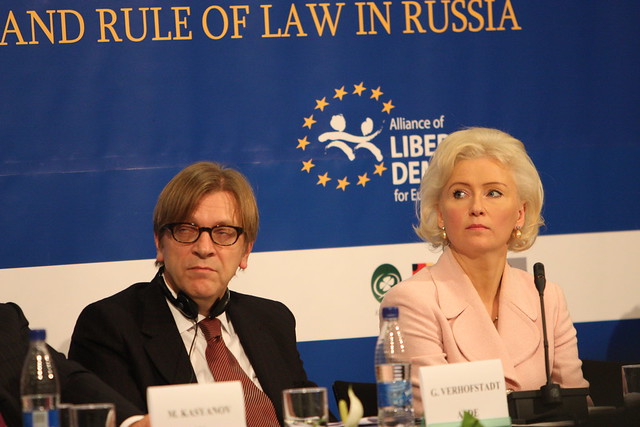Time for EU to Press Russia on Rights
 The time is ripe for the EU-Russia partnership to evolve from simple trade relations toward a process that will encourage Russia to improve its human rights record, argues a new opinion article published by Members of European Parliament Guy Verhofstadt and Kristiina Ojuland.
The time is ripe for the EU-Russia partnership to evolve from simple trade relations toward a process that will encourage Russia to improve its human rights record, argues a new opinion article published by Members of European Parliament Guy Verhofstadt and Kristiina Ojuland.
The article, which was published on the EUobserver website, argues that President Vladimir Putin’s intolerance for the democratic opposition has grown more severe since his return to the presidency for a third term. Citing the posthumous trial against corruption whistleblower Sergei Magnitsky, Verhofstadt and Ojuland argue that it is “abundantly clear that Putin looks for his strength in Russia’s totalitarian past.”
“Russia is not threatened by so-called Western values,” the authors write, “Nor is it threatened by the European Parliament, the US state department, by what Russia likes to call ‘unnamed foreign powers,’ by Russian girl-punk bands, by Americans citizens who adopt Russian children or by NGOs funded from abroad which it says want to undermine Russian stability. Instead, Russian citizens are themselves clamouring for change after being denied a genuine democratic choice in the Duma elections in December 2011.”
The authors warn that the current pace of developments in Russia poses a dangerous risk: “This combination of repression and radicalisation could easily see political stagnation degenerate into instability. It is a pressure cooker which can easily explode.”
Remarking on the “positive momentum” in the European Council and among EU member states on the human rights situation in Russia, the authors call on MEPs to make it “crystal clear” to Putin that trampling on democracy and human rights will have consequences for relations with Europe, while also proposing the introduction of a “new Helsinki process” that will create a network of influential and well-informed leaders in support of democracy and rights in Russia.
Russia is “a modern, pluralistic, multicultural country, whose people deserve better.” the authors conclude. “The EU must be willing to show determination over deference and principle over pragmatism.”



